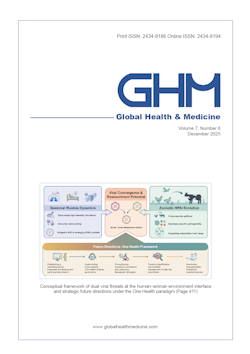Global Health & Medicine 2025;7(4):334-339.
Discontinuation of biosimilar infliximab in Japanese patients with rheumatoid arthritis achieving sustained clinical remission or low disease activity during the IFX-SIRIUS STUDY I (the IFX-SIRIUS STUDY II): A clinical, ultrasound, and biomarker-based effectiveness after discontinuation and reinitiation of biosimilar infliximab
Shimizu T, Kawashiri SY, Koga T, Kiya R, Morita M, Kuroda S, Tashiro S, Morimoto S, Yano H, Ueki Y, Dobashi H, Nozaki Y, Hosogaya N, Yamamoto H, Kawakami A
Rheumatoid arthritis (RA) is a chronic inflammatory disease affecting synovial joints. Biosimilar disease-modifying anti-rheumatic drugs offer cost-effective alternatives to originator biologics for RA treatment but remain expensive for long-term use. This prospective study investigated the clinical benefit of discontinuing CT-P13, a biosimilar of infliximab, in RA patients maintaining clinical remission or low disease activity. Five patients were enrolled from the IFX-SIRIUS STUDY I. CT-P13 was discontinued for 48 weeks, with evaluation using clinical indices, musculoskeletal ultrasound (MSUS), and serum biomarkers. Two patients experienced clinical relapse at weeks 5 and 36. The patient who relapsed at week 36 was re-administered CT-P13 and showed improved clinical outcomes without adverse events. Patients with non-clinical relapse showed no changes in disease activity scores or MSUS scores, with no notable alterations in serum cytokine levels. Over 50% of the patients maintained non-clinical relapse after CT-P13 discontinuation, and relapsed patients improved after re-administration without adverse events. This study was registered in the Japan Registry of Clinical Trials (https://jrct.mhlw.go.jp) on April 20, 2020, as jRCTs071200007.
DOI: 10.35772/ghm.2025.01054







